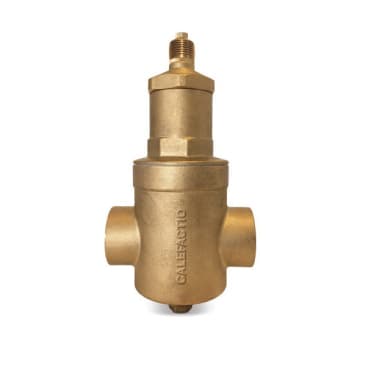Thank you for visiting Bartle & Gibson. If you encounter any issues or have feedback to share, please email us at [email protected]. Your input is greatly appreciated!

CALEFACTIO CXT-150P 1-1/2 PRS BRASS AIR SEPARATOR
Product Details
Attributes
Features
Resources
Calefactio Air Separator, 1-1/2 in Nominal, Press Connection, 150 psi, 250 deg F, Suitable Media: Coalescent, 50 % Maximum Percentage of Glycol, 23 gpm Flow Rate, Brass, 8-1/2 in H x 8-1/2 in W
Calefactions Cal-X-Tract air separators are equipped with a brush-type coalescing media, a calvent automatic air vent and designed with an oversized housing leading to a very high efficiency. Their function is to take air out of hydronic heating systems, allowing a better energetic performance while reducing the costly maintenance frequency. Their sturdy design allows to maintain their efficiency for whole duration of the systems lifetime.
- Equipped with calvent automatic air vent
- Anti-clogging vent (the head is designed to stay dry and clean, reducing the risks of clogging)
- A drain port is installed at the bottom of the separator
- Brush-type coalescing media to catch the finest micro-bubbles without affecting the flow
- Reduce the risk of pump cavitating and rust by oxygen
- Improve the systems efficiency
Product Details
Calefactio Air Separator, 1-1/2 in Nominal, Press Connection, 150 psi, 250 deg F, Suitable Media: Coalescent, 50 % Maximum Percentage of Glycol, 23 gpm Flow Rate, Brass, 8-1/2 in H x 8-1/2 in W
Calefactions Cal-X-Tract air separators are equipped with a brush-type coalescing media, a calvent automatic air vent and designed with an oversized housing leading to a very high efficiency. Their function is to take air out of hydronic heating systems, allowing a better energetic performance while reducing the costly maintenance frequency. Their sturdy design allows to maintain their efficiency for whole duration of the systems lifetime.
Attributes
Features
- Equipped with calvent automatic air vent
- Anti-clogging vent (the head is designed to stay dry and clean, reducing the risks of clogging)
- A drain port is installed at the bottom of the separator
- Brush-type coalescing media to catch the finest micro-bubbles without affecting the flow
- Reduce the risk of pump cavitating and rust by oxygen
- Improve the systems efficiency
